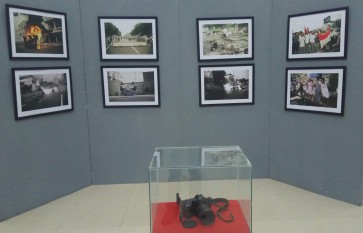Popular Reads
Top Results
Can't find what you're looking for?
View all search resultsPopular Reads
Top Results
Can't find what you're looking for?
View all search resultsGawai Festival unites Dayaks of two nations in music, culture
Art of defense: A Dayak man paints a shield during the 32nd Gawai Festival in Pontianak, West Kalimantan, on Tuesday
Change text size
Gift Premium Articles
to Anyone

A
span class="caption">Art of defense: A Dayak man paints a shield during the 32nd Gawai Festival in Pontianak, West Kalimantan, on Tuesday. The event aims to preserve the culture and traditional arts of the Dayak tribe, the native people of Borneo.(Antara/Jessica Helena Wuysang)
Though separated by two countries, the Dayak people, natives of Borneo island, meet once a year in Pontianak, West Kalimantan, to celebrate their shared roots and ancestry.
At the Gawai Festival, which is in its 32nd edition this year, celebrants sing, dance and make handcrafts to preserve the culture of their tribe, whose people have lived for centuries in the region’s rainforests.
About 500 Dayak Malaysians joined various events at the festival, along with local residents and tourists.
On Tuesday, Yusuf, 38, was seen carving a piece of wood for a competition. Originally from Java, he has lived in Pontianak for years and is familiar with the ways of the Dayak people.
He said that he was making a bukong, a man who volunteers to perform rituals and collect alms during a funeral.
“I have researched the subject for this carving competition and I think this is the most interesting figure of a Dayak,” he said.
Inspired by the Dayak day of harvest, the event was centered around a replica of a Radakng house, or a traditional long house.
Kartius, chairman of the event’s organizing committee, said the Dayak identity had to be preserved as part of Indonesia’s cultural heritage, in addition to attracting domestic and international tourists.
“The Dayak ethnicity is part of [our] country, and therefore, contributes to the nation’s heritage, while strengthening the bond between communities through art and culture,” Kartius said.
Alim Ga Mideh, a Malaysian of the Dayak Iban tribe, brings his friends to the Gawai Festival every year so they, too, can feel the sense of togetherness among the Dayak people, despite being separated by a state border.
This year’s event enjoyed the talents of a native-American band from the Lakota tribe in the United States. The trio performed at the opening ceremony on Saturday afternoon and on Sunday night.
Their presence was at the invitation of the US Embassy in Jakarta and was part of a cultural exchange program that included several Indonesian cities.
The festival also featured around 50 cultural workshops that included competitions on various traditional Dayak activities, such as Dayak cooking, tattoo painting hunting using a traditional blowgun.
Amid escalating sectarian tension in Indonesia, which included the jailing of non-active Jakarta governor Basuki “Ahok” Tjahaja Purnama on blasphemy, similar strains have heightened between the Dayak and Malay people in West Kalimantan, which raised concerns that open conflict would disrupt this year’s Gawai Festival.
However, the event — which ends this Saturday — has carried on without disturbances.
According to West Kalimantan Governor Cornelis, cultural preservation was important to strengthen national character and the bond between different ethnicities across Indonesia.
“The Dayak [tribe] alone consists of 405 sub-ethnic groups, spread across Borneo, including Sarawak [Malaysia] and Brunei. They have lived in harmony all along. They also worship different religions,” he said.
The Indonesian Democratic Party of Struggle (PDI-P) politician proclaimed that he was a staunch supporter of pluralism and diversity, and had threatened two clerics of the Islamic Defender’s Front (FPI) who tried to hold gatherings he believed would disrupt tolerance and pluralism in his province.









